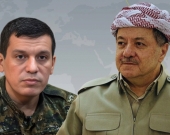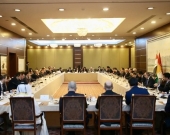$18m Earmarked for Kurdistan Region Development under UN

ERBIL, Kurdistan Region - More than $18 million will go toward the Kurdistan Vision 2020 Development Strategy following the signing of a joint trust fund between the Kurdistan Regional Government (KRG) and the United Nations.
The October 31 agreement will provide funds to further health, social services, education, employment, physical infrastructure and economic development in the Kurdistan Region in northern Iraq.
According to a press release from the United Nations Mission in Iraq (UNAMI), over $13.6 million will be financed by the KRG as the main funder, with the rest provided by the UN, “the principal co-funder.”
“The Fund will strengthen the development assistance coordination capacity for aid effectiveness within the Kurdistan Region and will provide one window for potential development assistance flowing into it,” said Ali Sandi, minister for planning in the KRG, during the signing ceremony.
Representatives from UNAMI and the UN’s Integrated Coordination Office for Development and Humanitarian Affairs (ICODHA), the main drivers behind the agreement, were both present during the signing.
“We are excited to team up with the Kurdistan Region Government to work together on reaching the strategic development objectives of the region and offer United Nations technical expertise to various ministries,” Jacqueline Badcock, the UN resident coordinator, said during the signing.
The KRG’s 2020 vision is to capitalize on the growth and economic boom experienced in the Kurdistan Region, which in 2012 was a whopping 12 percent. According to the KRG, it wants to set “a framework for policy development by government officials, define five-year policy priorities and outline ways the KRG could improve opportunities for people of the Region.”
In order to meet these goals, the KRG wants to make vast improvements to various sectors, diversify the economy with private sector investment and increase government efficiency and transparency.
The Kurdistan Region in Iraq for the past two decades has been slowly recovering from the devastating effects of Saddam Hussein’s “Anfal Campaign” to eradicate the Kurds in the north of the country, which resulted in more than 180,000 Kurdish casualties and the 1988 poison-gas attack on the Kurdish town of Halabja, one of the most devastating chemical attacks in modern history.
Now, with the help of the UN and the joint trust fund agreement the sky is the limit for the Kurdish Region, with billions of dollars in private investment for businesses, buildings, schools and hospitals and a vast potential for massive oil exports and income.
RUDAW












